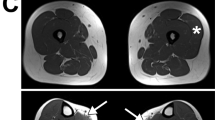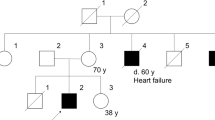Abstract
X-LINKED recessive Duchenne muscular dystrophy (DMD) is caused by the absence of dystrophin, a membrane cytoskeletal protein1,2. Dystrophin is associated with a large oligomeric com-plex of sarcolemmal glycoproteins3–10. The dystrophin–glycoprotein complex has been proposed to span the sarcolemma to provide a link fyetween the subsarcolemmal cytoskeleton and the extracellular matrix component, laminin7,9. In DMD, the absence of dystrophin leads to a large reduction in all of the dystrophin-associated proteins4,9,10. We have investigated the possibility that a deficiency of a dystrophin-associated protein could be the cause of severe childhood autosomal recessive mus-cular dystrophy (SCARMD) with a DMD-like phenotype11–14. Here we report the specific deficiency of the 50K dystrophin-associated glycoprotein (Mr 50,000) in sarcolemma of SCARMD patients. Therefore, the loss of this glycoprotein is a common denominator of the pathological process leading to muscle cell necrosis in two forms of muscular dystrophy, DMD and SCARMD.
This is a preview of subscription content, access via your institution
Access options
Subscribe to this journal
Receive 51 print issues and online access
$199.00 per year
only $3.90 per issue
Buy this article
- Purchase on Springer Link
- Instant access to full article PDF
Prices may be subject to local taxes which are calculated during checkout
Similar content being viewed by others
References
Hoffman, E. P., Brown, R. H. & Kunkel, L. M. Cell 51, 919–928 (1987).
Koenig, M., Monaco, A. P. & Kunkel, L. M. Cell 53, 219–228 (1988).
Campbell, K. P. & Kahl, S. D. Nature 338, 259–262 (1989).
Ervasti, J. M., Ohlendieck, K., Kahl, S. D., Gaver, M. G. & Campbell, K. P. Nature 345, 315–319 (1990).
Ohlendieck, K., Ervasti, J. M., Snook, J. B. & Campbell, K. P. J. Cell Biol. 112, 135–148 (1991).
Ervasti, J. M., Kahl, S. D. & Campbell, K. P. J. biol. Chem. 266, 9161–9165 (1991).
Ervasti, J. M. & Campbell, K. P. Cell 66, 1121–1131 (1991).
Ohlendieck, K. & Campbell, K. P. J. Cell Biol 115, 1685–1694 (1991).
Ibraghimov-Beskrovnaya, O. et al. Nature 355, 696–702 (1992).
Ohlendieck, K. et al. Neurology (in the press).
McKusick, V. A. Mendelian Inheritance in Man 9th edn (The Johns Hopkins Univ. Press, Baltimore and London, 1991).
Ben Hamida, M., Fardeau, M. & Attia, N. Muscle Nerve 6, 469–480 (1983).
Ben Jelloun-Dellagi, S. et al. Neurology 40, 1903 (1990).
Ben Hamida, M., Miladi, N., Turki, I. & Zaiem, H. J. neurol. Sci. 107, 60–64 (1992).
Love, D. R. et al. Nature 339, 55–58 (1989).
Khurana, T. S. et al. Neuromusc. Dis. 1, 185–194 (1991).
Hemmings, L., Kuhlman, P. A. & Critchley, D. R. J. Cell Biol. 116, 1369–1380 (1992).
Author information
Authors and Affiliations
Rights and permissions
About this article
Cite this article
Matsumura, K., Tomé, F., Collin, H. et al. Deficiency of the 50K dystrophin-associated glycoprotein in severe childhood autosomal recessive muscular dystrophy. Nature 359, 320–322 (1992). https://doi.org/10.1038/359320a0
Received:
Accepted:
Issue Date:
DOI: https://doi.org/10.1038/359320a0
This article is cited by
-
Dystrophin Involved in the Susceptibility of Slow Muscles to Hindlimb Unloading via Concomitant Activation of TGF-β1/Smad3 Signaling and Ubiquitin–Proteasome Degradation in Mice
Cell Biochemistry and Biophysics (2014)
-
Syntrophin proteins as Santa Claus: role(s) in cell signal transduction
Cellular and Molecular Life Sciences (2013)
-
Post-translational disruption of dystroglycan–ligand interactions in congenital muscular dystrophies
Nature (2002)
-
Adhalin deficiency : An unusual cause of muscular dystrophy
The Indian Journal of Pediatrics (2001)
-
rAAV vector-mediated sarcogylcan gene transfer in a hamster model for limb girdle muscular dystrophy
Gene Therapy (1999)
Comments
By submitting a comment you agree to abide by our Terms and Community Guidelines. If you find something abusive or that does not comply with our terms or guidelines please flag it as inappropriate.



